Posts Tagged ‘globular’
Sunday, August 30th, 2015
This globular form porcelain teapot was made in China in the mid-1700s for export to Europe and North America. It measures 6 inches high and 9 inches from handle to spout and is decorated in the famille rose palette with a coral scale ground and puce flowers.
Soon after the teapot dropped and the handle shattered, it was taken to a tinker, jeweler or metalsmith who fashioned this nicely made metal replacement handle. To help insulate delicate hands from the hot contents, the handle was encased in woven rattan. I have dozens of examples of woven rattan handles and have noticed distinctly different patterns among them. I am hoping to one day match up the woven handle patterns to specific makers, although I know that is a long shot. As an added bonus, a small section of missing rattan has been patched using string, no doubt at a later date, a true case of a make-do making-do.
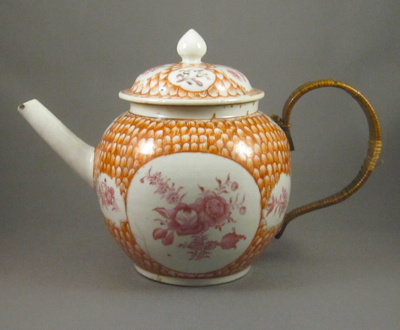
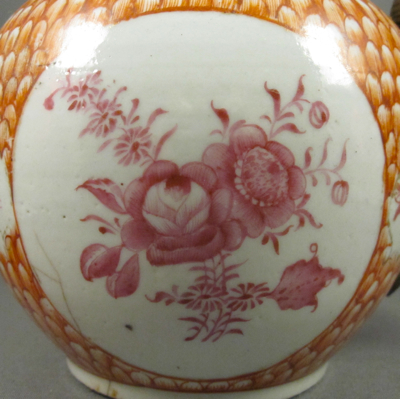
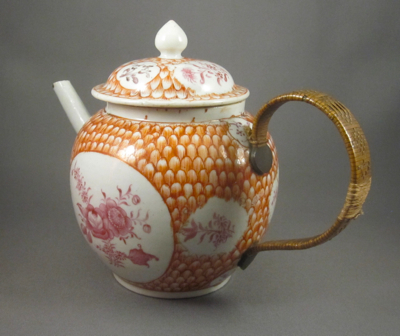
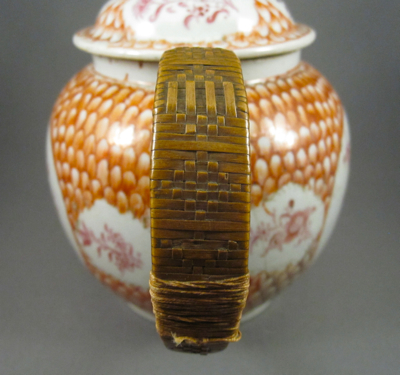
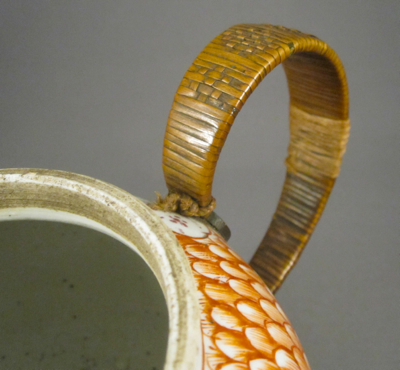
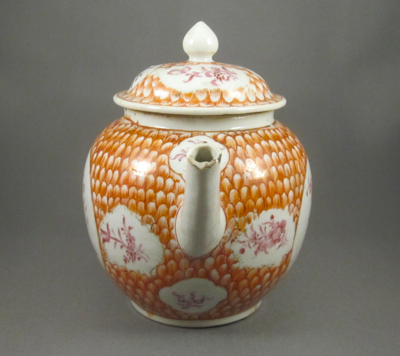
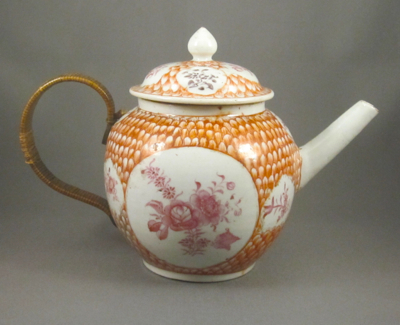
This teapot with similar form and decoration shows what the original loop handle on my teapot looked like before it took a tumble.
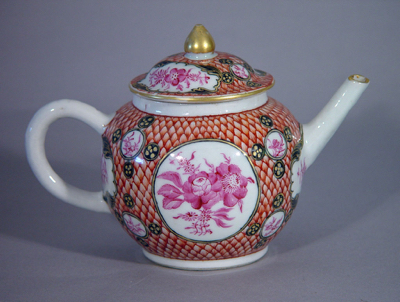
Photo courtesy of Earle Vandekar of Knightsbridge
Tags:Chinese, globular, metal handle, porcelain, rattan
Posted in teapot | No Comments »
Saturday, March 21st, 2015
This globular form teapot with hand painted floral decoration in cobalt blue and polychrome enamels was made in China for export to the European market in the mid to late 1700s. It measures 5-3/4″ high and 8-1/2″ wide from handle to spout.
After the teapot was dropped it was taken to a china mender who added an unusual crimped edge pewter sleeve at the base of the spout. Additionally, a hinge was added to attach the lid to the pot. I have many examples in my collection with metal chains added to keep teapots and lids together, but this is the first time I have seen an elaborate hinge of this sort.
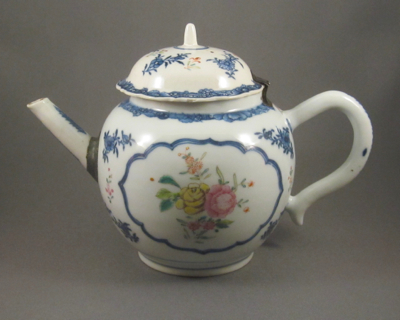
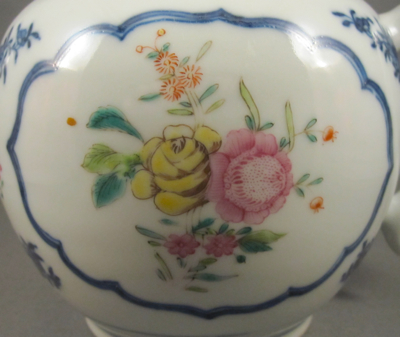
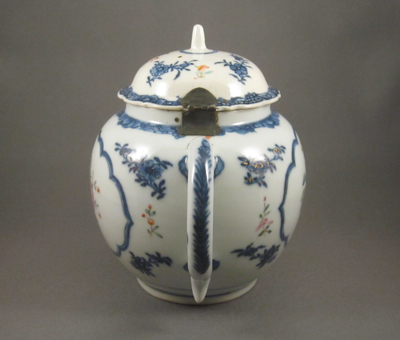
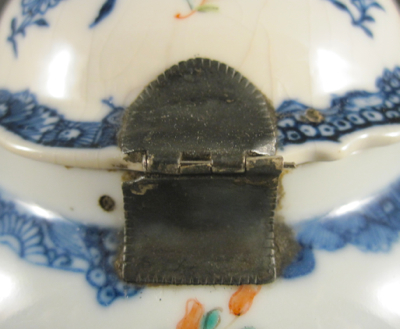
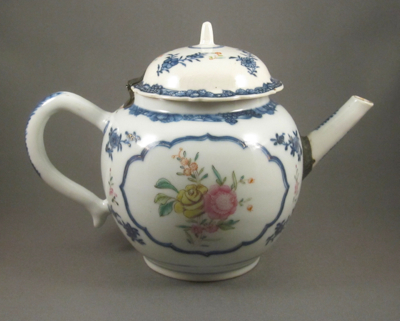
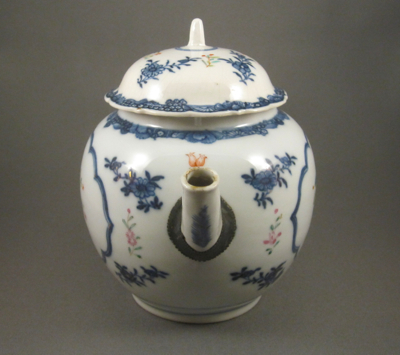
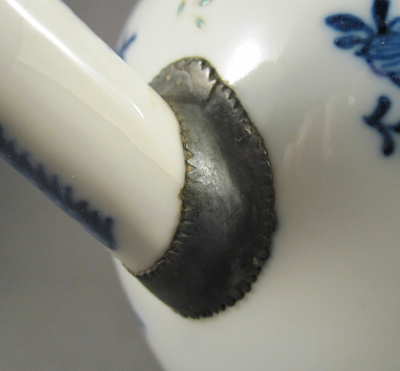
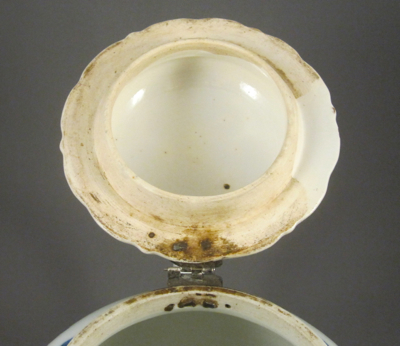
Tags:Chinese, globular, pewter, porcelain
Posted in teapot | No Comments »
Sunday, December 28th, 2014
This striking globular form teapot was made in China during the Qianlong period (1736-1795) for export to North America and Europe. It stands 5-1/4″ high and is decorated in cobalt underglaze with pavilions on islands in a lakeside setting.
After the original spout became damaged, the teapot was taken to a silversmith sometime in the 19th century, who replaced it with a silver Rococo style spout. I have seen many other examples of the same silver spout used on repaired teapots from the same period, so I imagine they were mass produced. In addition to the replacement spout, the broken handle has been riveted to the body and appears to be a later repair. By this point, the owner was taking no chances and chained the lid to the spout and handle to avoid further damage. On the underside is an etched signature Hood (?), but I am not sure if this was the owner of the teapot or the mender. I am hoping that it’s the latter and am on the hunt for more examples of signed ceramics.
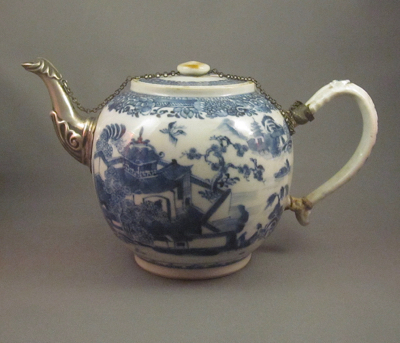

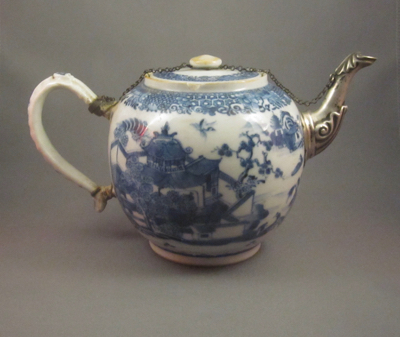
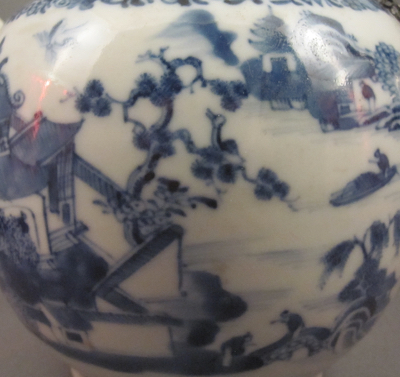
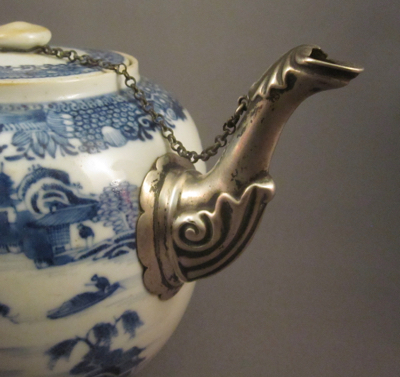
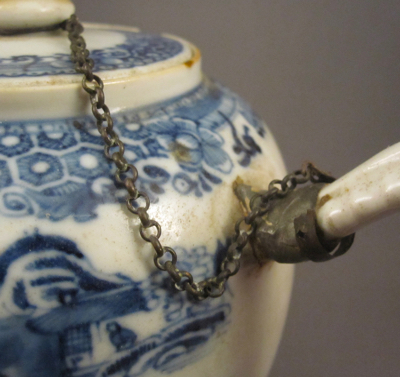
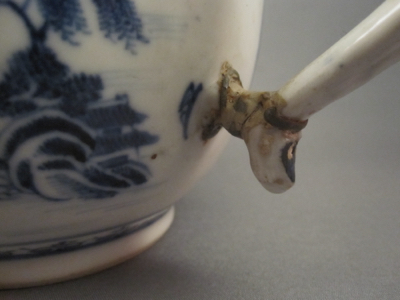
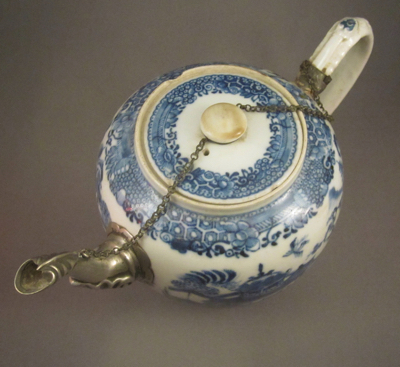
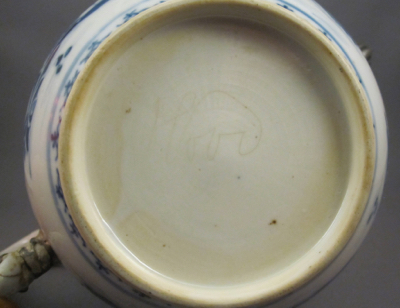
This teapot with similar form and decoration shows what the original spout on my teapot might have looked like.
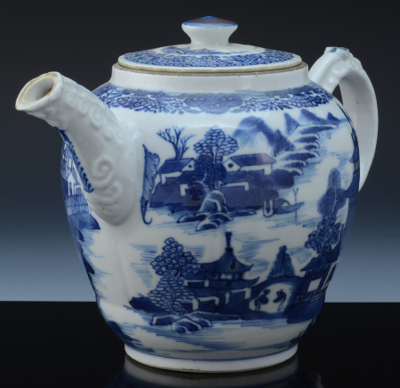
Photo courtesy of eBay
Tags:blue & white, Chinese, globular, metal spout, porcelain, silver
Posted in teapot | 2 Comments »
Sunday, December 21st, 2014
Wishing you all the best during the holiday season and for a healthy and Happy New Year!
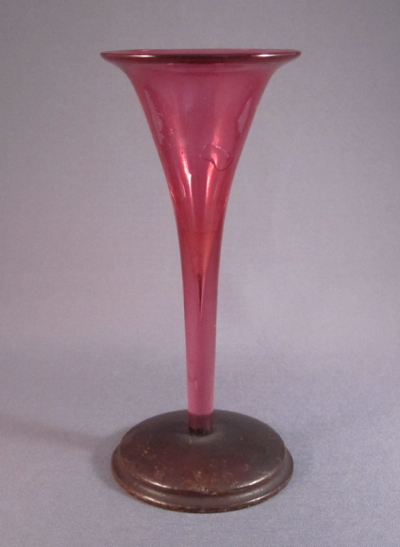
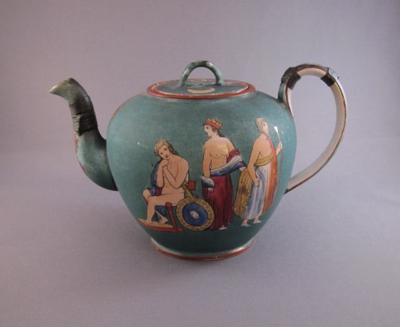
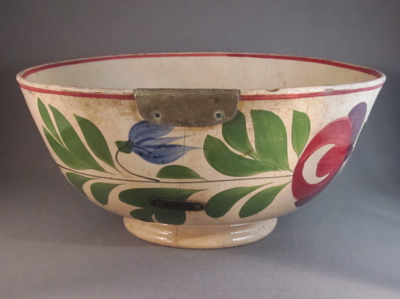
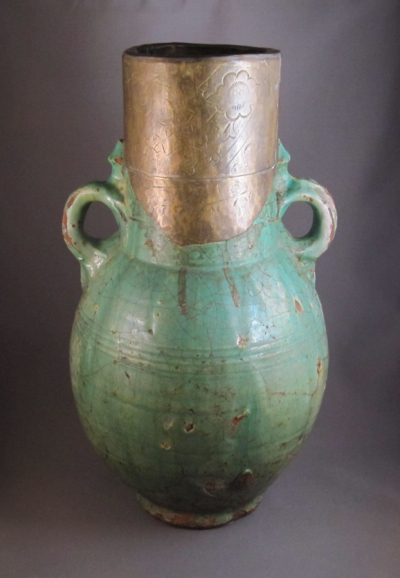
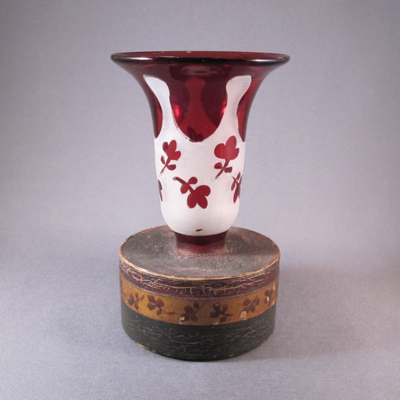
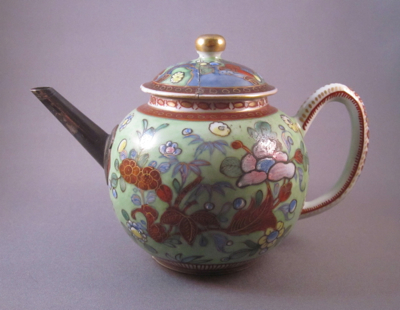
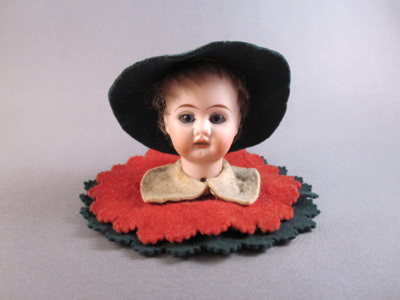
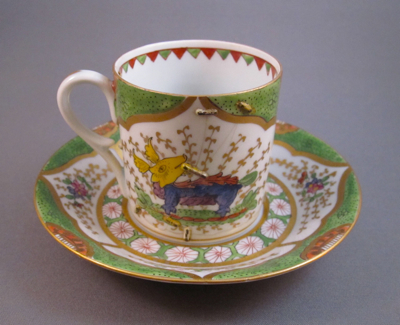
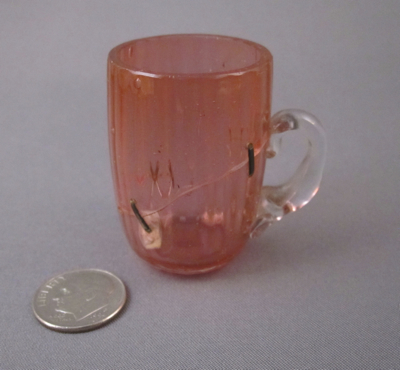
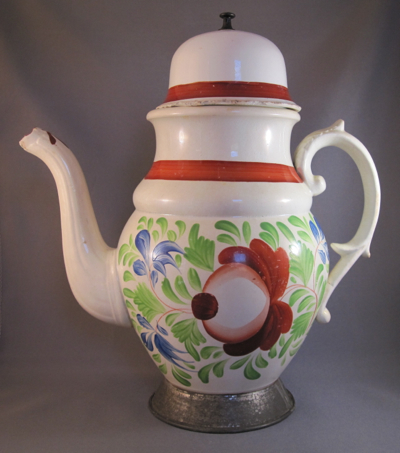
Tags:Chinese, clobbered, English, German, glass, globular, metal base, miniature, porcelain, pottery, silver, staples/rivets, wood base
Posted in bowl/dish, chocolate/coffee pot, cup/saucer, jug, plate/platter, teapot, toy, vase/vessel | 8 Comments »
Saturday, September 13th, 2014
This Qianlong period globular form teapot has a C shaped handle and an inlaid flat lid with round knob. It was made in China in the mid-1700s and stands 4-1/4″ tall and 7-3/4″ from handle to spout. The original blue underglaze decoration fell out of fashion shortly after it was made, as by the mid-1700s more “attractive colors” were the taste of the day. In order to keep up with the sudden demand for polychrome Chinese ceramics, factories in Europe took the unwanted blue and white decorated pieces and overpainted them with brightly colored enamels, often without regard for the original design beneath. This victim of clobbering, as it is also referred to, or Amsterdam Bont, when done in Holland, has been over decorated with the flower basket motif, one of the most popular designs.
The unusual form replacement silver spout appears to have been made by a skilled 18th century silversmith. It replaced a straight spout, but I think this replacement is much more interesting, and adds to the quirkiness of this twice-decorated teapot.
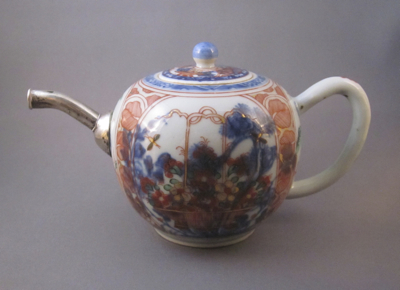
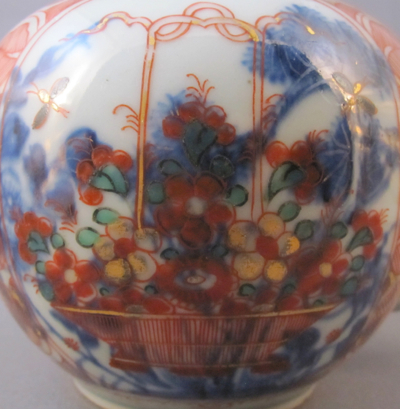
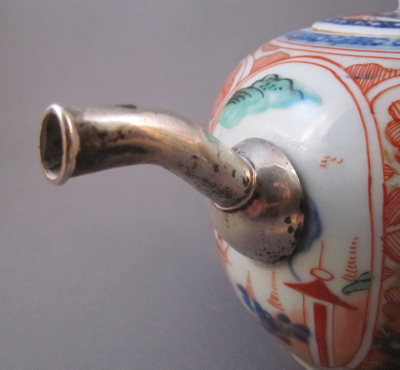
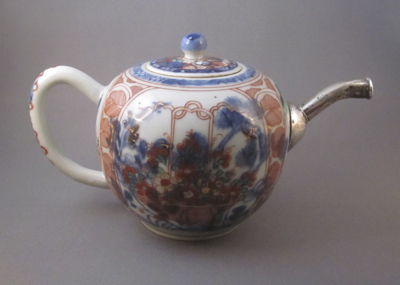
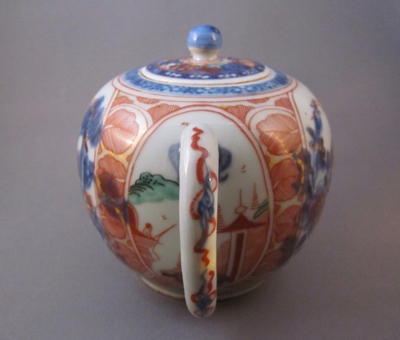
This teapot with similar form and decoration shows what the spout on my teapot might have looked like.
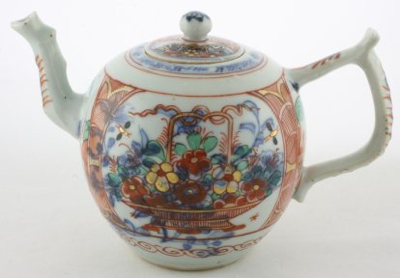
Photo courtesy of Pater Gratia Oriental Art
Tags:Chinese, clobbered, globular, metal spout, porcelain, Qianlong, silver
Posted in teapot | 1 Comment »
Sunday, February 9th, 2014
This globular form teapot was made in China during the Qianlong dynasty (1736-1795) for export to Europe and North America. It measures 5″ tall and 7-1/2″ wide from spout to handle and is decorated in the rouge-de-fer palette, with painted flowers in asymmetrical reserves using red, orange, and black enamels with gilt highlights on a chocolate brown ground. Batavian ware, aka Capuchin ware or Cafe au lait, was highly favored by the Dutch and named for the city of Batavia (today Jakarta, the capital of Indonesia), the center of Dutch trade in the 18th century.
An iron sleeve with sawtooth edge covers the tip of the broken spout, replaced in the 19th century by a local tinker or itinerant china mender. A simple loop iron handle, bearing the remains of white gesso, replaces the broken original. Unlike many similarly replaced metal handles I find wrapped in rattan, this one shows evidence of being an armature, upon which layers of compound were applied then painted to emulate the original form and surface. As this type of unstable compound deteriorates over the years, dealers and collectors have been known to chip away at it, exposing the bare metal. The conservator in me likes an original crusty, compound-laden handle but the collector in me prefers a more esthetically pleasing clean metal surface.
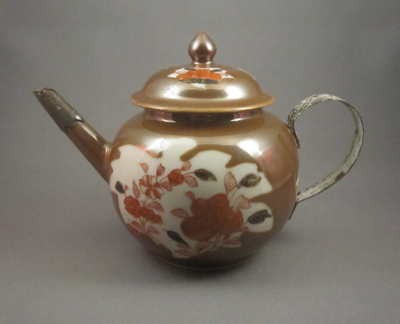
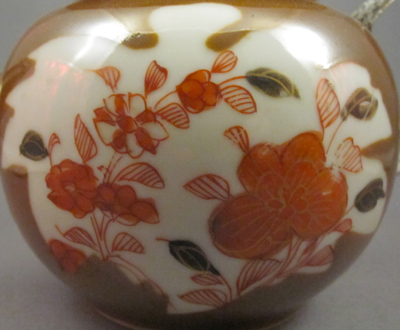
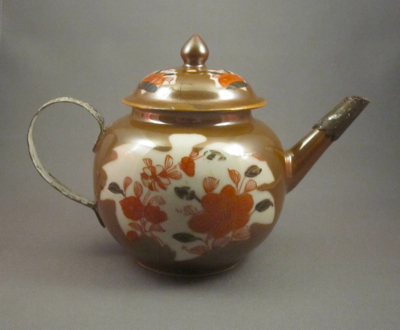
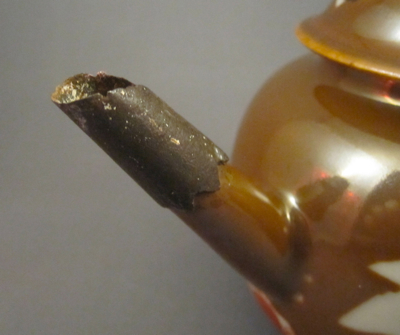
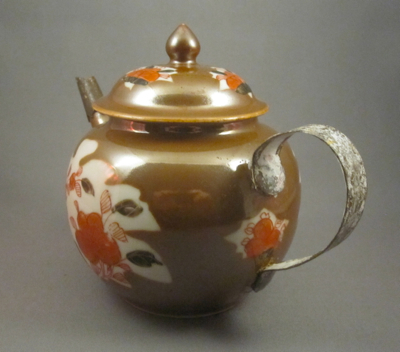
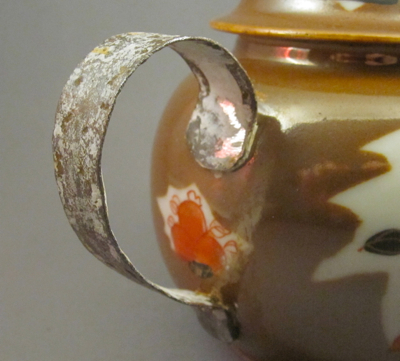
This teapot, with nearly identical form and decoration, still has its original handle and spout. But in my humble opinion, it is not nearly as interesting as mine.
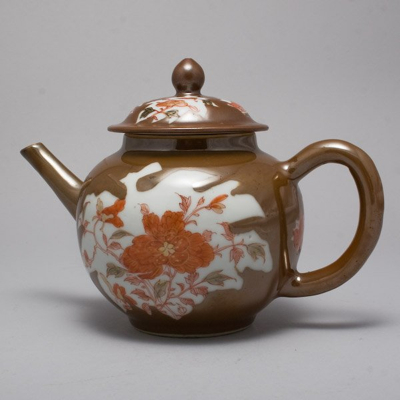
Photo courtesy of LiveAuctioneers
Tags:Chinese, globular, metal handle, metal spout, porcelain
Posted in teapot | 2 Comments »
Saturday, November 9th, 2013
What a sad little teapot this is. Once pristine, this late 18th century Chinese porcelain globular-form teapot with Mandarin decoration in the Famille Rose palette has suffered years of abuse and neglect. It stands 5-1/4″ high and is 7-1/2″ wide from the tip of the spout to the end of the handle. I am told the hand painted decoration shows the Qianlong King making a secret visit to the river bank. Not only did the original porcelain loop handle fall off after the teapot slipped from the hands of whoever was serving tea or tidying up, but the body cracked and is chipped in numerous places. Regardless, the teapot must have been highly valued, as it was brought to a china restorer who created a rattan-wrapped metal replacement handle sometime in the 1800s. The lid did not fare well either, as after it shattered into 6 pieces at a later date, it was hastily glued back together, leaving many large gaps. But at last it ended up in my collection where it proudly stands alongside hundreds of other wounded survivors living together in solidarity.
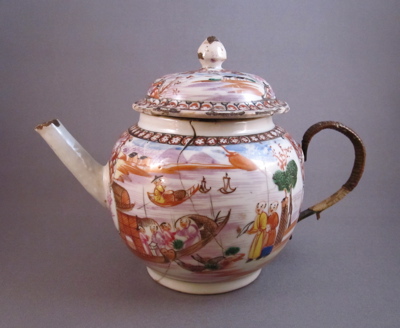
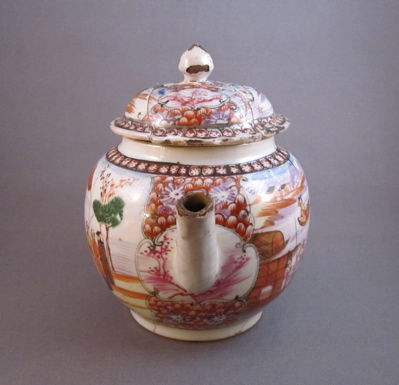
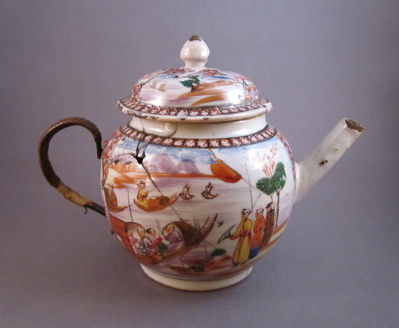

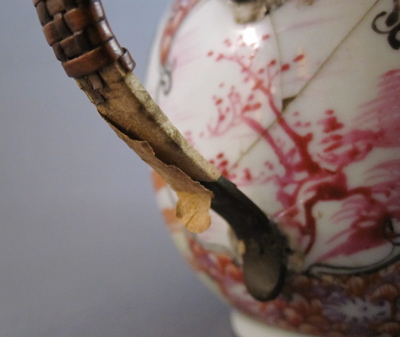

This teapot, with similar form and decoration, shows what the original handle on mine would have looked like.
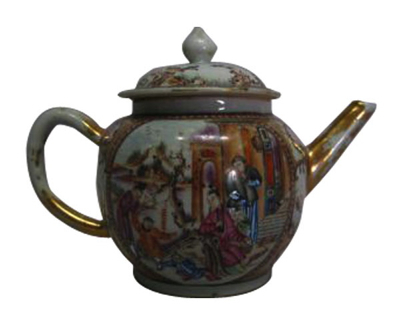
Photo courtesy of William Word Fine Antiques
Tags:Chinese, globular, Mandarin, metal handle, rattan
Posted in teapot | 2 Comments »
Saturday, August 4th, 2012
Chinese globular form porcelain teapot with underglaze decoration featuring a kingfisher and pink peonies in the famille rose palette. This popular form was made for export to North America and Europe in the mid 1700s.
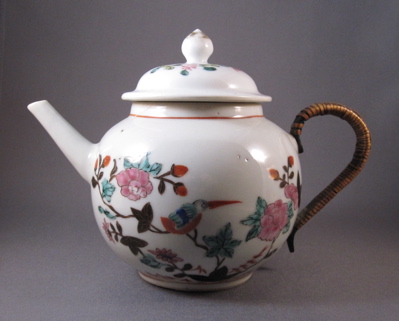
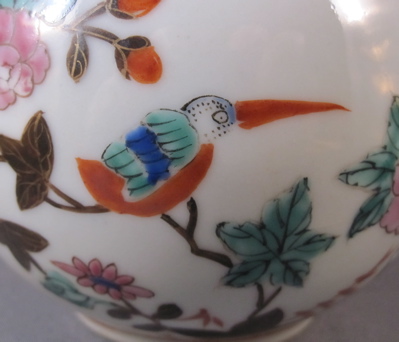
Teapot measures 5-1/2″ high and 7-3/4″ wide, from tip of spout to end of handle.
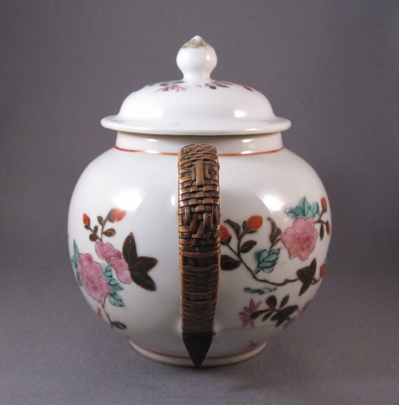
After the original porcelain loop handle broke off, a tinker formed a replacement using bronze covered in woven rattan. I have many examples of wrapped handles on teapots, each with slight variations. I am researching the different decorative patterns used and hope to identify the distinctions unique to each maker.
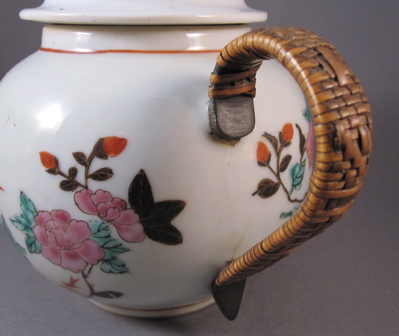
This globular teapot from the same period shows what the handle on my piece would have looked like before it broke off.
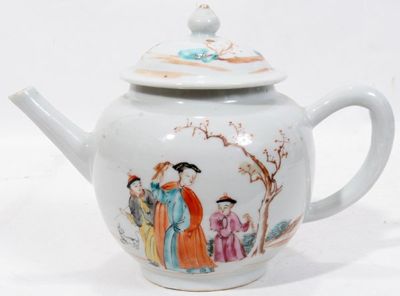
Photo courtesy of LiveAuctioneers
Tags:Chinese, globular, metal handle, porcelain, rattan
Posted in teapot | 5 Comments »
Sunday, April 4th, 2010
This Chinese export porcelain teapot from the middle 19th century is globular in form and decorated “en grisaille” (painted in shades of gray) with gilt highlights along the top rim.
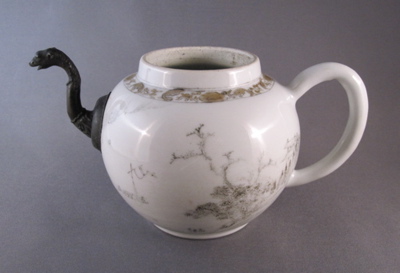
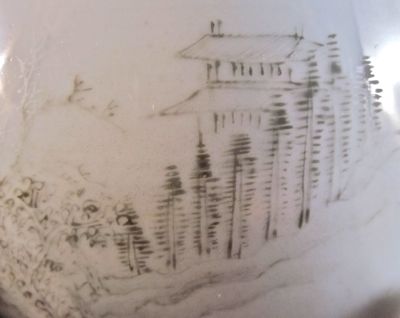
Teapot measures 3-3/4″ high.
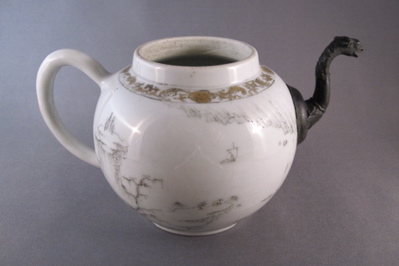
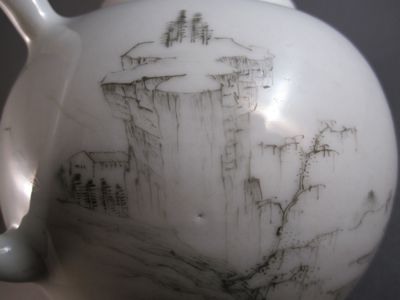
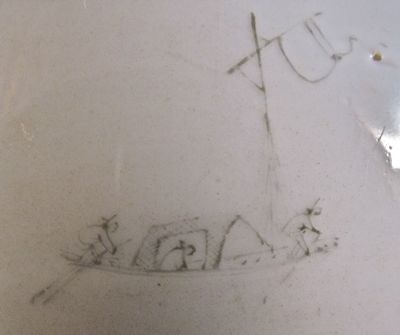
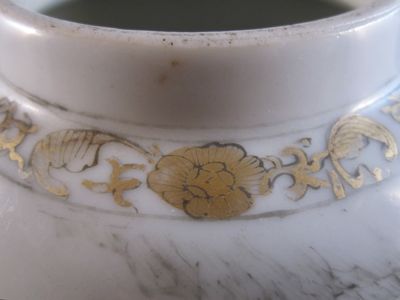
The simply shaped original spout was replaced with a finely detailed bronze spout in the form of a serpent.
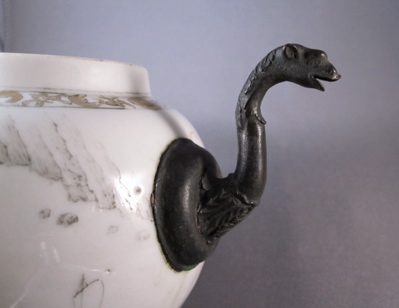
Another teapot decorated en grisaille, shown with original spout and lid.
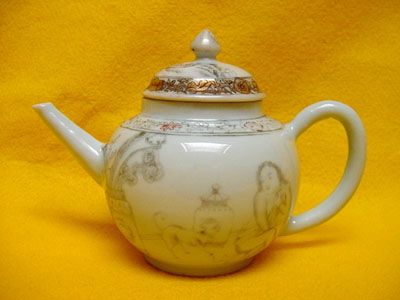
Photo courtesy of Richard Gould Antiques
Tags:Chinese, globular, metal spout, porcelain
Posted in teapot | No Comments »
Saturday, March 27th, 2010
Globular shaped Chinese export porcelain teapot has finely painted enamel and gilt “Mandarin” decoration.
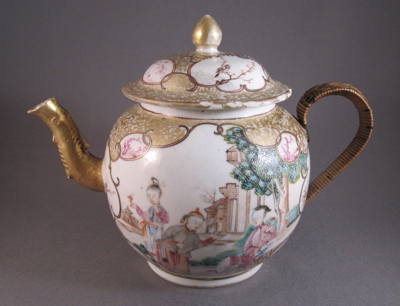
Both sides of the teapot have exquisitely detailed figures painted in the famille rose palette.
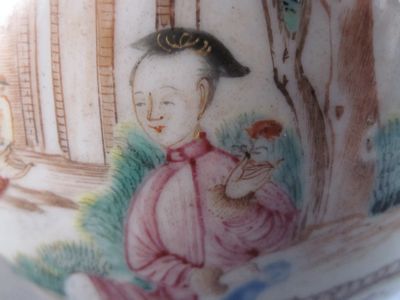
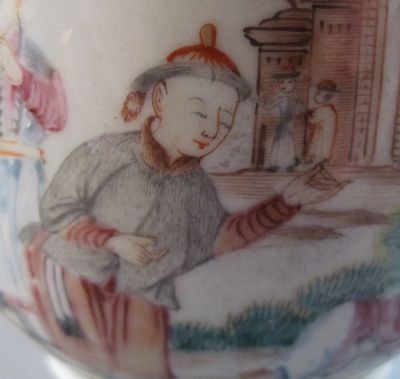
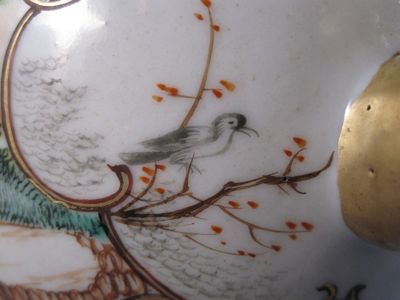
Teapot measures 5-1/2″ to the top of the lid.
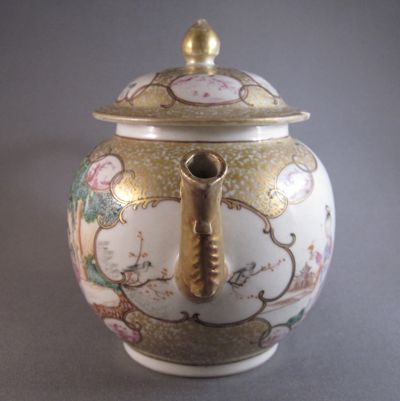
The nicely woven rattan covered bronze handle is a replacement, fabricated in the late 18th to early 19th century.
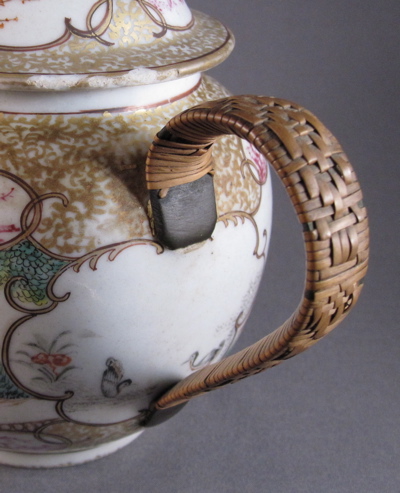
This teapot with similar shape body and spout shows what the original handle might have looked like.

Photo courtesy of Guest & Gray
Tags:Chinese, globular, metal handle, porcelain, rattan
Posted in teapot | No Comments »











































































